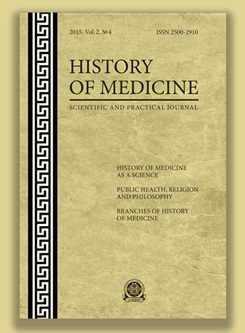For publication in Scopus, Web of Science, and more – Expert consultation for indexed journal submissions.
About the Journal
Current Issue
About History of Medicine
History of Medicine (HOM, ISSN: 2409-5834) is an open-access, peer-reviewed scholarly journal dedicated to exploring the historical development of medicine, healthcare, and public health across different civilizations, cultures, and eras. The journal provides an interdisciplinary platform for historians, medical scholars, and researchers to share insights into how medicine has evolved and influenced human society through time.
HOM aims to advance academic understanding of medical heritage by examining how past discoveries, beliefs, and institutions continue to shape modern medicine. The journal promotes critical and comparative studies, connecting history with philosophy, sociology, ethics, and cultural analysis.
Submit Your Article
We welcome original research articles, review papers, and historical case studies that explore the evolution of medical thought, institutions, and practice. Topics may include ancient and modern healing systems, medical ethics, public health history, global health transitions, and the relationship between medicine and culture.
Join Our Editorial Board
If you are a historian, medical researcher, or scholar specializing in medical humanities or healthcare history, we invite you to join our editorial community. Contribute your expertise to uphold the journal’s standards of rigorous peer review, ethical scholarship, and academic excellence.
Know More
Learn more about our editorial policies, peer-review guidelines, publication ethics, and indexing information. Contact us for collaborations, partnerships, or academic events focused on the history and philosophy of medicine.








